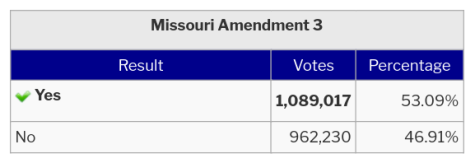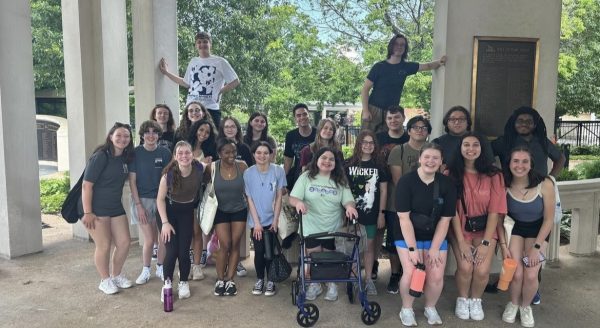What Amendment 3 Means for Missouri
The passage of Amendment 3 designates Missouri as the 20th state to legalize recreational cannabis
Missouri legalized recreational cannabis this past midterm election cycle after previously legalizing medical marijuana back in 2018.
This past midterm election cycle drew in millions of voters throughout the nation, who made it clear that they deemed many topics pertinent. Issues most prevalent on the ballot ranged from abortion rights, voting-relating policies and the abolition of language permitting enslavement in state constitutions. Be that as it may, the foremost measure leading Missourians to the polls was one regarding the legalization of recreational marijuana.
Two of the five states with cannabis-related measures on the ballot – Missouri and Maryland – voted in support of each respective measure, further expanding the accessibility and governing of recreational marijuana. Missouri’s Amendment 3 passed with a slim 53-47 margin.
Constitutional Amendment 3, going into effect on Dec. 8, legalizes the purchase, possession, consumption, use, delivery and sale of recreational cannabis for adults 21 and older. The amendment also outlines the blueprint of a state program regulating who can obtain licenses to grow and sell cannabis recreationally.
Existing medical marijuana businesses in the state can apply for licenses to grow, manufacture, sell and transport recreational cannabis once the amendment goes into effect. The state health department has until Feb. 6 to consider applications, meaning that sales could begin as early as February.

State voters previously legalized medical marijuana in 2018 with Amendment 2, which passed with a margin of 66-34. Prior to the 2022 midterm elections, the possession of 10 grams or less of recreational cannabis was decriminalized, though it was once a criminal misdemeanor punishable by fine.
With the passage of Amendment 3, Missouri became the first state to immediately expunge the records of people with past nonviolent marijuana-related convictions. The amendment also allows those currently incarcerated for marijuana charges to petition for release.
The sales tax rate on non-medical cannabis will be 6%. There will be additional state and local sales taxes added to the price that cannot exceed 3%. Money raised through the state tax will be deposited to the Veterans, Health and Community Reinvestment Fund, as outlined in Amendment 3.
Legal Missouri 2022 was the campaign registered in support of the amendment, obtaining over 390,000 signatures to get the measure on the ballot. Campaign Manager John Payne – who also managed the successful campaign to legalize medical marijuana in Missouri – released a statement following the passage of Amendment 3.
“I want to personally thank the army of volunteers and supporters who made Missouri legalization and expungement a reality.” Payne wrote, “It’s been a long time coming and we live in a better state for it.”
St. Louis Mayor Tishaura Jones was among those urging voters to reject the amendment. “We deserve better,” she wrote on Twitter, expressing how the amendment falls short on promises of decriminalization.
State Rep. Ashley Bland-Manlove cited another shortcoming of the amendment, explaining how “eighty percent of the licenses will go to persons who already have a medical license. So that means nobody else new gets into this industry, which is heart-wrenching since so many people I know – people who actually put blood money, like their settlements from car accidents, to try and get into the medical industry.”
Many argued that Missouri should wait for a more nuanced amendment to legalize recreational cannabis, while others concurred that Amendment 3 may have been the best chance of legalization in the state – the slim 53% winning vote is great evidence of this stance.
The amendment does have provisions that prohibit the following: public use of marijuana, driving any motor vehicle under the influence of marijuana, using marijuana in the workplace, and individuals under the age of 21 using marijuana.
Amendment 3 also contains provisions that alter the state’s handling of medical marijuana. For instance, nurse practitioners are now permitted to recommend medical cannabis. Identification cards for medical marijuana will be valid for 3 years instead of 12 months, and the fee for cultivation will be lowered from $100 to $50.
Any person who has a nonviolent marijuana charge and is not currently incarcerated will have their record reviewed and expunged by June 8, 2023, with the exception of those having charges for driving under the influence or selling cannabis to minors.











